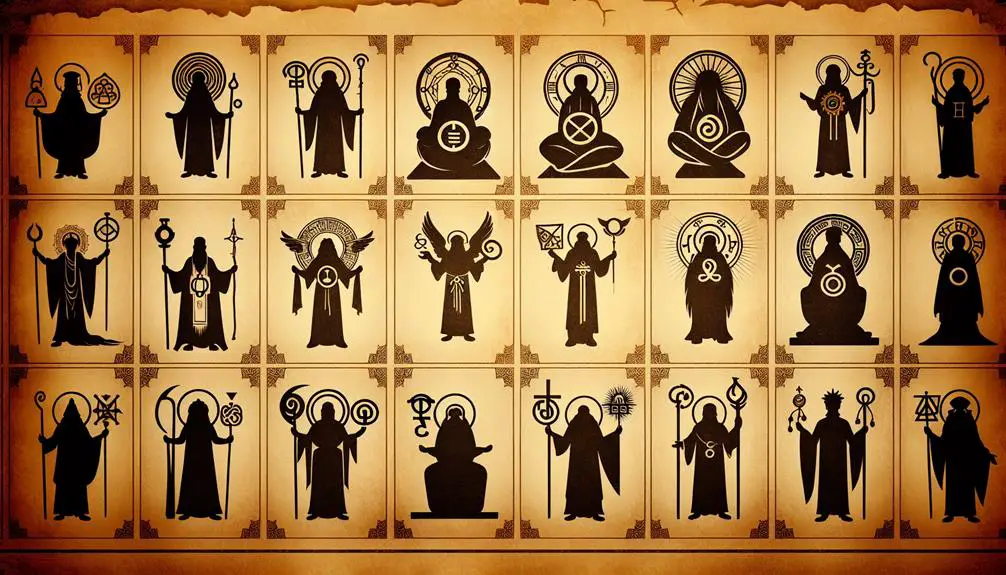Wonder how many Josephs are mentioned in the Bible? Uncover their unique stories and the impact they had on biblical narratives.

How Many Josephs Are in the Bible
Navigating the sacred texts, you'll notice that the name Joseph isn't reserved for a singular figure; it's a thread woven through various narratives, each distinct from the last. You're likely familiar with the patriarch Joseph, known for his coat of many colors, and Joseph of Nazareth, the earthly father of Jesus.
But what about Joseph of Arimathea or Joseph called Barsabbas? There are more individuals sharing this name than you might initially realize, and each brings a unique story and contribution to the biblical tapestry. Exploring these characters offers a deeper understanding of the text and the recurring themes associated with the name Joseph.
Why not embark on a journey to uncover just how many Josephs are mentioned and what their stories tell us about the broader narrative?
Key Takeaways
- There are multiple Josephs in the Bible, each with a distinct role and story.
- Joseph the Patriarch and Joseph the Father of Jesus are among the most prominent.
- Lesser-known Josephs, like Joseph of Arimathea and Joseph called Barsabbas, also contributed significantly to biblical narratives.
- The presence of several Josephs adds depth and complexity to the biblical tapestry, illustrating diverse contributions to faith and history.
The Patriarch Joseph

Among the various Josephs mentioned in the Bible, the Patriarch Joseph stands out as a central figure whose life story is a profound narrative of resilience and divine providence. You'll find his journey, detailed in the Book of Genesis, is punctuated by a series of remarkable events that highlight his character and the unfolding of God's plan.
Joseph's dreams, in particular, serve as pivotal moments that not only forecast his future but also trigger the onset of his trials. These dreams, symbolic of his eventual rise to a position of power, inadvertently sow seeds of jealousy among his brothers.
This envy sets the stage for Joseph's tumultuous path, as his brothers' jealousy escalates to the point of plotting his demise, leading to his sale into slavery. However, what's compelling about Joseph's story is his unwavering faith and how it shapes his response to adversity.
Despite the betrayal and suffering, he doesn't succumb to bitterness. Instead, Joseph's resilience and adherence to his faith propel him through his trials, demonstrating a profound trust in divine providence. His ability to forgive his brothers and recognize the divine hand at work in his hardships is a powerful testament to his character and faith.
Joseph of Arimathea

Shifting focus from the Patriarch Joseph, another significant figure bearing the same name emerges in the New Testament: Joseph of Arimathea, whose actions play a crucial role in the events following the crucifixion of Jesus Christ. This Joseph, a wealthy member of the Jewish council, steps forward in a time of need, offering his own new tomb for Jesus' burial. This act wasn't only a demonstration of his devotion but also a significant departure from common burial practices of the time.
Burial practices in ancient Judea typically involved placing the deceased in family tombs, carved out of rock, where they'd be left to decompose. Once only bones remained, these would be gathered and placed in an ossuary. Joseph's offer of his own tomb, therefore, was an extraordinary gesture of respect and honor towards Jesus. It's crucial to understand that Joseph's tomb, being new and unused, was free from ritual impurity, making it a fitting place for Jesus' burial according to Jewish customs.
Joseph of Arimathea's actions underscore the importance of burial rites and the respect for the dead in ancient Jewish culture. His boldness in requesting Jesus' body from Pontius Pilate and his subsequent role in the burial process highlight his significance in the early Christian narrative, providing a dignified resting place for Jesus in the critical moments following the crucifixion.
Joseph the Father of Jesus

Another Joseph of profound significance in the Bible is Joseph the Carpenter, who's revered as the earthly father of Jesus Christ and plays a pivotal role in the New Testament narrative. Unlike the more passive portrayals often seen, Joseph's carpentry wasn't merely a backdrop to his character. Rather, it symbolizes his dedication, hard work, and the humility to accept divine plans beyond human understanding. As Mary's spouse, Joseph's initial reaction to her inexplicable pregnancy showcases his righteousness and compassion. Opting to divorce her quietly rather than expose her to public disgrace, his actions speak volumes of his character.
Joseph's obedience to divine messages, directing him to marry Mary despite societal norms, and later to flee to Egypt to protect Jesus, underscores his unwavering faith and protective nature. His role extends beyond just providing for his family through his carpentry. Joseph serves as a model of trust in God's plan, embodying virtues of faith, obedience, and guardianship.
Analyzing Joseph's life reveals a multifaceted character shaped by divine interventions and moral steadfastness. His legacy, often overshadowed by the miraculous nature of Jesus' birth, is pivotal in understanding the humble beginnings of Christianity and the importance of faith-guided action.
Joseph Called Barsabbas

Joseph called Barsabbas, also known as Justus, presents a unique figure in the New Testament, whose brief mention carries significant implications for early Christian community dynamics. You'll find his story nestled within the Acts of the Apostles, where Joseph's identity and Barsabbas' role intersect in a pivotal moment for the nascent church.
- Joseph's Nomination: He was one of the two candidates considered to replace Judas Iscariot as the twelfth apostle. This nomination itself speaks volumes about his standing and reputation within the early Christian community.
- Barsabbas' Role as a Follower: Despite not being chosen, his presence in the narrative underscores the importance of faithfulness and readiness to serve, qualities that defined the early followers of Jesus.
- Symbol of Early Church Unity: Joseph, known by two names, symbolizes the diversity within the early Christian community and their collective pursuit of a common goal—the spread of Jesus' teachings.
Joseph called Barsabbas, or Justus, embodies the collective spirit of devotion and unity among Jesus' followers. His brief mention, while not detailing extensive contributions, highlights the critical role of every individual in the fabric of the early Christian community, no matter how prominently they're featured in scripture.
Other Josephs in Scripture

Beyond the tale of Joseph called Barsabbas, scripture unfolds a tapestry of individuals bearing the same name, each contributing uniquely to the biblical narrative. Delving into the depths of the text, you'll find that Joseph's interpretations of dreams and visions play a pivotal role, not just in his own storyline but in the broader context of divine messages and guidance. His ability to decipher the dreams of the Pharaoh led to pivotal moments that shaped the course of Hebrew history, underscoring the importance of divine wisdom and insight.
Equally significant is Joseph's lineage, which threads through the fabric of biblical genealogy with precision. It's not just about tracing his descendants; it's about understanding the impact of his legacy. This lineage includes a variety of characters, each of whom plays a role in the unfolding story of salvation history. From this perspective, Joseph isn't just a character in a story; he's a cornerstone of a much larger narrative, his life and actions rippling through generations.
Analyzing these other Josephs in scripture, it's clear that while they share a name, their contributions are distinct, each adding a layer of depth and complexity to the biblical tapestry.
Frequently Asked Questions
How Has the Name Joseph Evolved in Different Cultures and Languages Over the Centuries?
You're exploring Joseph's etymology and cultural adaptations, delving into how this name has transformed across languages and societies. Originating from Hebrew, Joseph has morphed into José in Spanish, Giuseppe in Italian, and Josef in German, reflecting each culture's linguistic nuances.
These adaptations not only signify the name's global spread but also highlight the intricate interplay between language evolution and cultural identity, showcasing how a single name can embody diverse cultural heritages and histories.
What Are the Most Notable Artistic Representations of the Various Josephs in the Bible, and How Do They Differ?
You'll find that the most notable artistic representations of Josephs in the Bible vary greatly. Joseph's Dreamscapes are vividly brought to life, with Symbolic Colors playing a key role in depicting his divine foresight and wisdom.
Each portrayal differs in detail and style, reflecting the unique cultural and historical contexts of the artists. These depictions serve not just as religious icons but also as profound explorations of Joseph's character and the broader biblical narratives.
Can the Influence of the Biblical Josephs Be Seen in Modern-Day Names or Naming Trends?
Absolutely, the influence of biblical Josephs shines through in modern naming conventions. You'll notice that names like Joseph remain popular worldwide, a testament to their enduring legacy.
This trend showcases how biblical figures have shaped modern Josephs, reflecting a deep-seated cultural and religious resonance. Analyzing this, it's clear that these ancient names haven't only survived but thrived, embedding themselves into our identity fabric with remarkable tenacity.
How Have the Stories of the Different Josephs Been Adapted or Referenced in Contemporary Literature or Media?
You'll find that Joseph-inspired movies and games weave biblical narratives into contemporary storytelling. These adaptations often reimagine or directly reference the tales of Josephs, blending ancient wisdom with modern narratives.
This trend showcases the timeless appeal and influence of these stories across media. By analyzing these works, one can see how biblical themes of resilience, faith, and redemption are reinterpreted, ensuring their relevance and resonance in today's cultural landscape.
Are There Any Major Archaeological Discoveries Related to the Biblical Josephs, and What Insights Do They Provide?
Imagine uncovering an ancient artifact directly linked to one of the biblical Josephs.
While no such discovery has definitively pinpointed Joseph's tomb, ongoing debates and Egyptology studies offer tantalizing parallels that fuel controversies.
These explorations delve into the historical reality of Joseph's existence and his impact on Egyptian society.
Conclusion
In conclusion, the Bible introduces several individuals named Joseph, each with their unique story and significance.
For instance, imagine the Patriarch Joseph, whose journey from being sold into slavery to becoming Egypt's second-in-command, teaches resilience and faithfulness amidst trials.
This analysis underscores the depth and diversity of biblical characters named Joseph, showcasing their integral roles within Scripture's narrative landscape.
Their stories, ranging from leadership to humble servitude, provide a rich tapestry of lessons and insights for readers.



Sign up